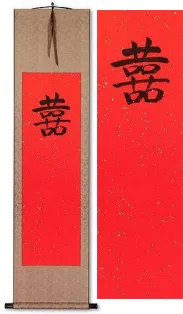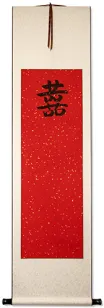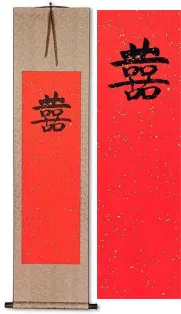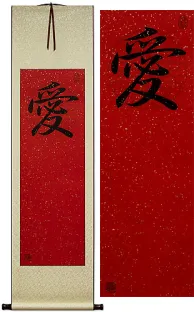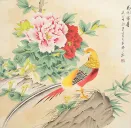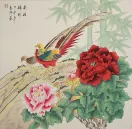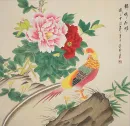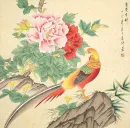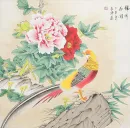Many custom options...
And formats...

50th Golden Wedding Anniversary in Chinese / Japanese...
Buy a 50th Golden Wedding Anniversary calligraphy wall scroll here!
50th Golden Wedding Anniversary
幸福金婚 means “Happy Golden Anniversary” and is a great gift for a couple who is celebrating 50 years together.
The first two characters mean happy, blessed, or happiness.
The last two characters mean “couple's golden anniversary.” It means “golden wedding” or “golden marriage,” but this is only used for the 50-year-mark of a marriage (the same way we use gold to represent 50 years in the west).
幸福金婚 is a nice title to use with an inscription. You could request something like, “Happy 50th Anniversary, Mr. and Mrs. Smith,” to be written down the side of this title in smaller Chinese characters.
Please note: This can be pronounced and understood in Japanese but not as commonly used in Japan. Japanese people who read this will understand it but might tend to feel it’s of Chinese origin.
This in-stock artwork might be what you are looking for, and ships right away...
Gallery Price: $90.00
Your Price: $49.88
Gallery Price: $90.00
Your Price: $49.88
Gallery Price: $90.00
Your Price: $49.88
Gallery Price: $90.00
Your Price: $49.88
Gallery Price: $268.00
Your Price: $148.88
Gallery Price: $268.00
Your Price: $148.88
Gallery Price: $63.00
Your Price: $35.00
Gallery Price: $65.00
Your Price: $35.88
Gallery Price: $268.00
Your Price: $148.88
Gallery Price: $65.00
Your Price: $35.88
Gallery Price: $268.00
Your Price: $148.88
Chinese Golden/Red Butterfly & Flower Painting
Discounted Blemished
Gallery Price: $53.00
Your Price: $29.00
Gallery Price: $90.00
Your Price: $49.88
Not the results for 50th golden wedding anniversary that you were looking for?
Below are some entries from our dictionary that may match your 50th golden wedding anniversary search...
| Characters If shown, 2nd row is Simp. Chinese |
Pronunciation Romanization |
Simple Dictionary Definition |
金婚式 see styles |
kinkonshiki きんこんしき |
golden wedding (anniversary); 50th wedding anniversary |
The following table may be helpful for those studying Chinese or Japanese...
| Title | Characters | Romaji (Romanized Japanese) | Various forms of Romanized Chinese | |
| 50th Golden Wedding Anniversary | 幸福金婚 / 倖福金婚 幸福金婚 | kou fuku kin kon koufukukinkon ko fuku kin kon | xìng fú jīn hūn xing4 fu2 jin1 hun1 xing fu jin hun xingfujinhun | hsing fu chin hun hsingfuchinhun |
| In some entries above you will see that characters have different versions above and below a line. In these cases, the characters above the line are Traditional Chinese, while the ones below are Simplified Chinese. | ||||
Successful Chinese Character and Japanese Kanji calligraphy searches within the last few hours...

